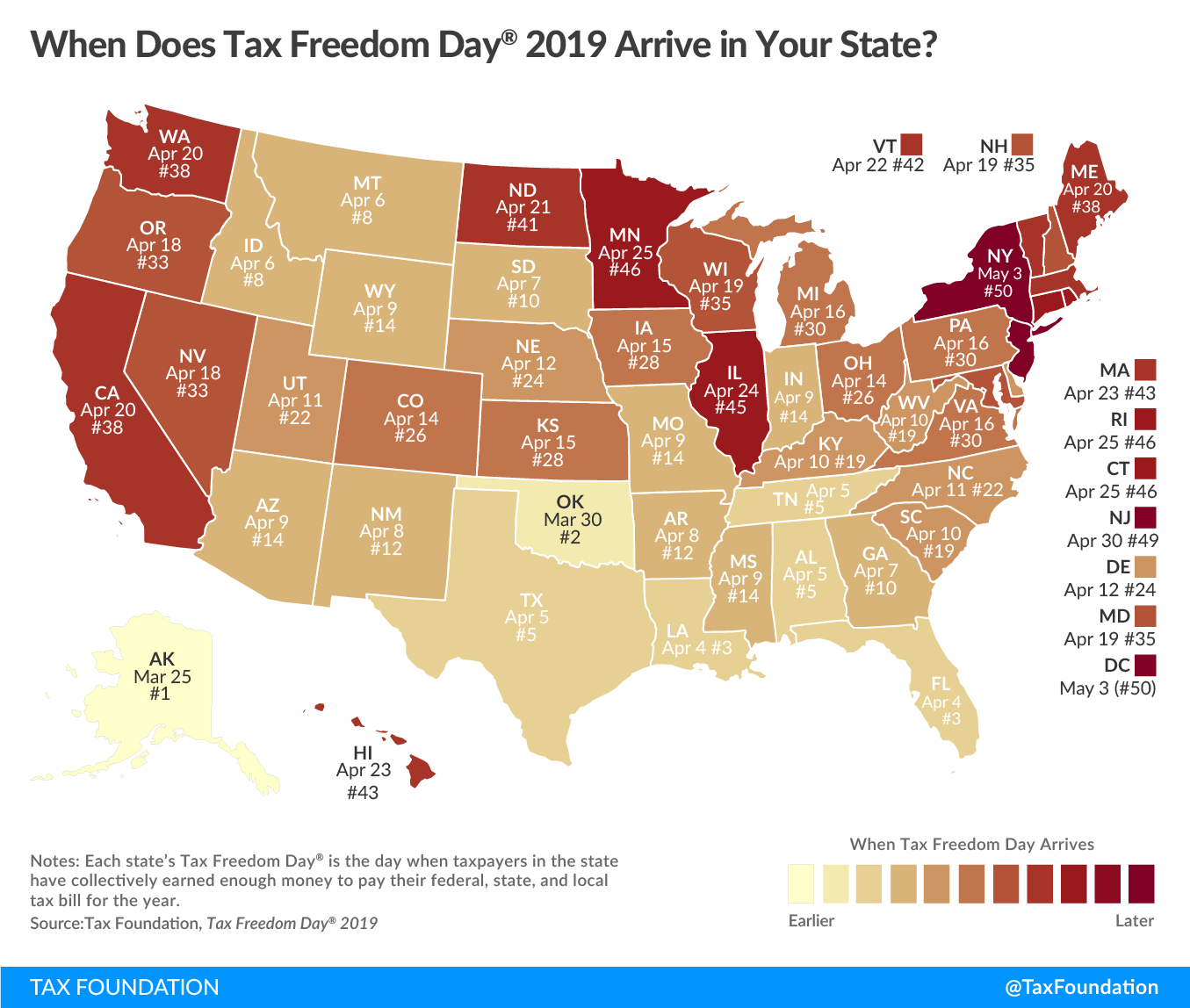CLT News Release
Monday, April 22, 2019
Tomorrow is Tax Freedom Day in Massachusetts
(#43 nationally)
|
Background
What Is Tax Freedom
Day?
Tax Freedom Day® is the day
when the nation as a whole has earned enough money to pay
its total tax bill for the year. Tax Freedom Day takes all
federal, state, and local taxes and divides them by the
nation’s income. In 2019, Americans will pay $3.42 trillion
in federal taxes and $1.86 trillion in state and local
taxes, for a total tax bill of $5.29 trillion, or 29 percent
of national income. This year, Tax Freedom Day falls on
April 16, or 105 days into the year.
Tax Freedom Day 2019 is April 16th
Tax Foundation - April 10, 2019
When Is My State’s Tax
Freedom Day?
The total tax burden borne by
residents of different states varies considerably due to
differing state tax policies and the progressivity of the
federal tax system. This means that states with higher
incomes and higher taxes celebrate TFD later: New York (May
3), New Jersey (April 30), and Connecticut (April 25).
Residents of Alaska will bear the lowest average tax burden
in 2019, with Tax Freedom Day arriving on March 25. Also
early are Oklahoma (March 30), Florida (April 4), and
Louisiana (April 4).
Tax Freedom Day 2019 is April 16th
Tax Foundation - April 10, 2019
Tax Freedom Day in 2018 and
2019 was five days earlier than it was in 2017, in large
part due to the recent federal tax law, the Tax Cuts and
Jobs Act.
Tax Freedom Day 2019 is April 16th
Tax Foundation - April 10, 2019 |
|
CLT News Release
Tomorrow, April 23, is finally Tax Freedom
Day in Massachusetts.
According to the Washington, DC-based Tax
Foundation, nationally on average this year taxpayers worked
just to pay the costs of government the entire first 105
days.
Massachusetts taxpayers will work an
additional week – 112 days – just to fund the costs
of government. This extra week of laboring to satisfy
government demands is due to higher state and municipal
taxes.
As always, Massachusetts ranks at near-bottom
of the 50 states, with one of the latest dates taxpayers
cease working entirely for government and begin working for
themselves and their families. This year’s report ranks the
Bay State tied with Hawaii at 43rd-latest. Only taxpayers
in six states (and the District of Columbia) are liberated
from tax confiscation even later than in the Massachusetts.
The Tax Foundation annually calculates the
day taxpayers stop working entirely just to pay off their
tax burdens. The Foundation produces both a national
average and a breakdown by each state for comparison.
The Tax Foundation states: "In calculating
Tax Freedom Day for each state, we look at taxes borne by
residents of that state, whether paid to the federal
government, their own state or local governments, or
governments of other states. Where possible, we allocate tax
burdens to each taxpayer’s state of residence."
|
Latest State Tax
Freedom Day 2019 |
|
Ranking |
State |
Date |
|
#43 (tied) |
Hawaii |
Apr 23 |
|
#43 (tied) |
Massachusetts |
Apr 23 |
|
#45 |
Illinois |
Apr 24 |
|
#46 (tied) |
Connecticut |
Apr 25 |
|
#46 (tied) |
Minnesota |
Apr 25 |
|
#46 (tied) |
Rhode Island |
Apr 25 |
|
#49 |
New Jersey |
Apr 30 |
|
#50 (tied) |
District of Columbia |
May 3 |
|
#50 (tied) |
New York |
May 3 |
CLICK IMAGE
BELOW TO ENLARGE

Tax Foundation
Tax Freedom Day 2019 is April 16th
FULL REPORT
|
While some in the Legislature want to increase taxes or add more during
the House budget debate this week and beyond, it is most important to
recognize that the commonwealth does not have a lack of revenue.
The problem is an insatiable spending addiction. One stark example is
the indefensible over-spending on transportation infrastructure.
The latest Reason Foundation
Annual Highway Report ranks Massachusetts as 44th worst state for
profligate highway spending — 390% above the national average.
In the table below, using data from
the Reason Foundation report, CLT selected and compared Massachusetts
with New Hampshire (and included the national average). They are New
England states which share a common border and a similar climate.
It should be recognized that New
Hampshire has neither a state income tax nor sales tax.
|
Capital and Bridges Disbursements per
State-Controlled Mile |
|
Massachusetts |
$299,246 |
|
New Hampshire |
$77,762 |
|
National Average |
$91,992 |
|
Maintenance Disbursements per
State-Controlled Mile |
|
Massachusetts |
$80,573 |
|
New Hampshire |
$59,215 |
|
National Average |
$28,020 |
|
Administrative Disbursements per
State-Controlled Mile |
|
Massachusetts |
$77,086 |
|
New Hampshire |
$21,594 |
|
National Average |
$10,864 |
|
Total Disbursements (including bond principal
and interest, etc.)
per State-Controlled Mile |
|
Massachusetts |
$695,443 |
|
New Hampshire |
$197,468 |
|
National Average |
$178,116 |
|
Source: Reason Foundation Policy Study No.
457, February 8, 2018, "23rd Annual Highway Report — The
Performance of State Highway Systems"
https://reason.org/wp-content/uploads/2018/01/23rd_annual_highway_report.pdf |
CLT executive director Chip Ford noted: “’Tax Freedom Day’ arrives late
as usual in Massachusetts, this year a week after the national average.
Objective evidence such as the Reason Foundation’s annual highway report
dispassionately proves that Massachusetts doesn't have a revenue
problem ― it doesn't need to keep raising taxes and creating new ones.
The players on Beacon Hill have an insatiable appetite for spending ever
more with abandon, without consideration of taxpayers who provide every
cent.”
#
# #
Citizens for Limited Taxation ▪ PO
Box 1147 ▪ Marblehead, MA 01945
▪ (781) 639-9709
|